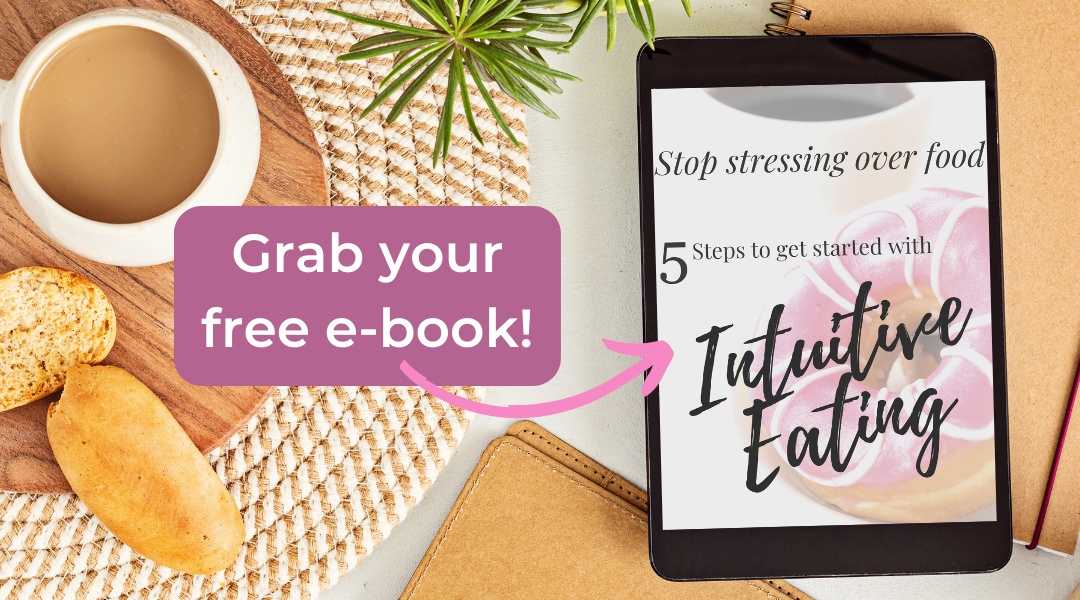What is diet culture?

And 6 common lies diet culture tells us about health.
You want to stop obsessing over food and finally stop hating your body. But you also know that your body is not healthy and needs to be changed. You live in a diet culture, we all do. A world which makes us second guess our own bodies and food choices so we spend unnecessary money on health and weight loss. Our diet culture will always try to convince us we are not enough and that we need diet foods and services instead.
Keep reading to learn how diet culture can make you second guess what you really need to be healthy and what you can do to stop obsessing over food.
Listen instead
What is diet culture
Diet culture is the system of food and body beliefs that are normalised in our world. We grow up and live within a culture where the dominant messages about food and bodies are that being thin is good, being fat is bad and what you eat makes you a morally good or bad person.
These messages are often presented as truth and unchallenged. We absorb them and they become beliefs. We then reinforce diet culture ideals through our own interactions with the world.
At its core, the diet culture we live in promotes food restriction, obsession around food and exercise, engaging in risky or unhealthy behaviours to avoid fatness and it stigmatises people based on body size. It also creates anxiety about the social, physical, and romantic consequences of failing to achieve thinness or not being seen to eat healthily.
This is diet culture.
Diet culture in our world
Diet culture really is everywhere. We absorb food shame and body ideals through marketing, movies, conversation, public spaces, fitness spaces, healthcare practices and more. Diet culture is sometimes direct but often it is much more subtle.
Direct diet culture messages can look like:
- Teasing, bullying, “fat jokes”.
- Being denied certain healthcare treatments unless you lose weight.
- Workplace discrimination due to stereotypes.
- Weight loss marketing everywhere you look.
- Unsolicited healthy eating or weight loss “advice”.
Subtle diet culture messages include:
- Public seating not accommodating all bodies and therefore public spaces not being welcoming to all bodies.
- Fitness spaces also not welcoming all bodies and abilities.
- Weight loss and body shaming marketing disguised as “health” or “motivation”.
- Clothes stores not carrying clothes in larger sizes.
- Colleagues talking about how they will “make up” for the office birthday cake.
- Parents talking about their stomach’s not being in shape in front of their children.
- Food being labelled as “guilt-free”.
- Calories displayed on restaurant menus and the list goes on.
Our diet culture normalises disordered eating, stressing over food and hating our bodies. Diet culture makes us think it is ok that our world only accommodates some bodies and abilities. But diet culture is not normal and it’s not healthy.
Here’s 6 common lies that diet culture tells us about health:
- Diet culture worships thinness or muscularity as being healthier. But body diversity is completely normal. Celebrating diversity in body shapes and sizes is healthy, trying to control our bodies to be smaller is not healthy.
- Diet culture tells us that weight loss is always an achievement and even just trying to lose weight is healthy. This keeps you trapped in dieting cycles. But dieting and weight cycling is not healthy.
- Diet culture demonises certain foods. It tells us there’s good and bad foods and that we can be good or bad for the way we eat but all foods fit in a healthy and balanced life.
- Diet culture tells us it’s ok to oppress people who don’t fit narrow body ideals as a motivator for weight loss. This leads to discrimination and inequality which is never healthy or acceptable.
- Diet culture normalises distrusting and hating our bodies. But disconnecting from our bodies will never achieve health or living our fullest lives.
- Diet culture normalises feeling guilt, shame and fear of foods. But guilt and shame is not health promoting and does not encourage healthy eating.
How does diet culture get away with spreading such hurtful messages?
Diet culture beliefs are “acceptable” in our culture as we are told that body size is largely in our control. If people want to be “accepted, worthy and healthy” all they have to do is just choose to lose weight. Although, this is not true and weight loss diets don’t work.
Diet culture also hides behind health. We hear that it’s not healthy to be in a larger body or it’s not healthy to eat that type of food. We are told we need motivation to be healthier. But, discrimination and body shaming are not health promoting. We can’t tell someone’s health by body size and no food is healthy or unhealthy in isolation.
But most importantly, there’s no morality to health and someone else’s health is simply none of our business.
We need to reject diet culture
Diet culture does not have our health, happiness, wellbeing or romantic interests at heart.
Adhering with diet culture does not actually lead to thinness or health promoting behaviours. Diet culture creates anxiety, lower self worth, less engagement in supportive activities, disordered eating, food stress and lower quality of life. Even if we are not consciously dieting, we have all absorbed diet culture beliefs and this causes harm.
How we can reject diet culture
- Notice and become aware of diet culture in your world.
- Make your home a place of body acceptance free from body shaming talk.
- Give yourself permission to let go of any message, advice or information that does not feel supportive for you.
- Consider who benefits from you spending money on weight loss or diet foods?
- Give yourself compassion for any uncomfortable eating behaviours and try bring in curiosity.
- Learn to trust and connect with your own body.
Through rejecting diet culture and developing trust and connection with your body, intuitive eating will help you to truly find food and body freedom.
 For support to find your food and life freedom through intuitive eating, grab your free e-book “5 steps to get started with intuitive eating”!
For support to find your food and life freedom through intuitive eating, grab your free e-book “5 steps to get started with intuitive eating”!
Author Bio:
Written by Emma Townsin, Registered Dietitian and Certified Intuitive Eating Counsellor
Emma is the founder of Food Life Freedom and the host of the Food & Life Freedom Podcast. For personalised support to stop stressing over health and heal your relationship with food and your body, learn how you can fast track your way food and life freedom.
Want 1-to 1 support?
Learn how you are supported to feel good around food.








